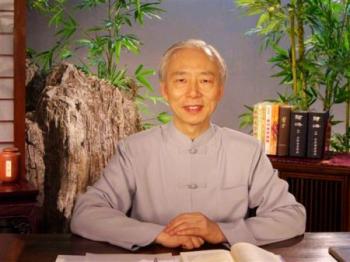Traditional Chinese Medicine is a healing art that is thousands of years old. The earliest references can be found in the medical classic, “Shennong Bencao Jing.” The Yellow Emperor’s classic of internal medicine, “Huangdi Neijing,” is a thorough portrayal of diagnostic and therapeutic methods, including acupuncture. Chinese medicine differs considerably from science-based Western medicine. Renowned Taiwanese doctor Hu Naiwen explained the basic philosophies underlying Chinese medicine during an interview with The Epoch Times.
Hu Naiwen began his studies in Western medicine and completed more than ten years of research in that discipline. Twenty years ago he decided to devote his practice to Chinese medicine. Studying “Huangdi Neijing,” he discovered methods that had already been used for the treatment of SARS. He credits the success of his medical treatment with his profound knowledge of Chinese medicine.
ET: You had previously conducted Western [allopathic] science-based medical research but then switched to Chinese medicine. What is the greatest difference between Chinese and Western [allopathic] medicine?
Hu: Each system aims to maximize health. Actually, there are considerable differences between the two. One example is in the diagnosing of illnesses. According to traditional Chinese medicine, reasons for illnesses are attributed to factors like inner heat, cold, dampness, dryness, fear, anger, shock, or worry. Western [allopathic] medicine empahsizes the following as [some of the] causes of illnesses: bacteria, viruses, and lack of proper nutrition.
ET: What prompted you to switch to Chinese medicine?
Hu: During my research I read of the link between acupuncture and neurology. I wanted to deepen my understanding of acupuncture, and [while studying] I eventually stumbled upon documentation of curing many illnesses through acupuncture. My scientific hunger consumed me. I needed to learn more about acupuncture and decided to study it further. Through those studies, I became acquainted with the core of Chinese medicine, and I have been tremendously enthusiastic about it ever since.
ET: Some say that Western [allopathic] medicine heals superficially the obvious illness symptoms, while Chinese medicine eliminates the root cause of an illness.
Hu: Chinese medicine deals with illnesses twofold: It abolishes the symptoms and heals the underlying reason illnesses. By merely dealing with the symptoms, one prevents a precise analysis of illnesses, thus preventing genuine healing. Chinese medicine is progressive, because it fights illnesses on two fronts.
ET: Why does one frequently get a cold following a change in season?
Hu: That is true. Many people do get a cold during those times. One can have gone through a cold winter without getting any colds, but when spring arrives one catches a cold. According to Chinese medicine, this is due to ignorance in acclimatizing to the new season. Spring is the time when all things begin to sprout, blossom, and bloom. Summer is the time for growth. Fall presents us with harvests, and winter is the time for rest. Winter is the time of year to avoid hard work and stress as much as possible, protect oneself from the cold, and sleep as much as needed. By patterning one’s daily life according to the seasons, one protects the immune system, and can look forward to and enjoy healthy seasonal changes.
ET: What suggestions does Chinese medicine have for skin conditions and allergies?
Hu: Nowadays, more and more people complain about skin irritations and allergies. Some can be attributed to foods, which the body is unable to tolerate. Such foods lead to itching, redness, crusting, or scaling. Even people who are normally allergy-free complain about increased itching in various places, and when scratched these spots become red and inflamed. Chinese medicine also views these symptoms as a failure to accord with the seasons. Such lack of seasonal adjustments is increasing, because people devise ever more ways to artificially change their surroundings. There is more to it: It begins with overheated housing and ends with air-conditioned rooms. The human organism cannot tolerate such sudden changes. Heating and air conditioning provide a certain amount of comfort, but the over-use or misuse of these technologies can stress the body, and show up as skin irritations.
ET: Thank you for this interview.
Hu: You are welcome. I was glad to do it.










Friends Read Free